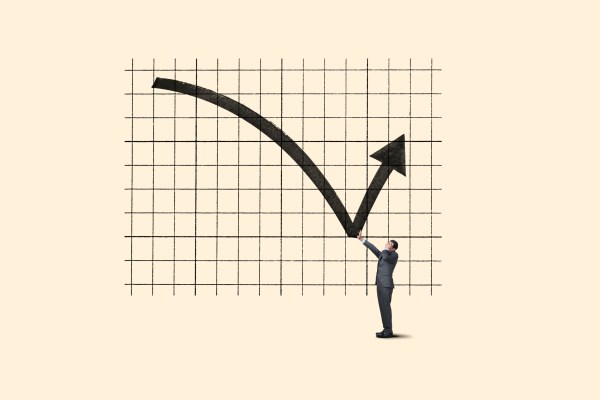For the past year, everyone’s been predicting that the muted exit environment and bone-dry funding market would bring a reckoning for many late-stage companies.
We’ve been seeing layoffs and cost-cutting measures across the board as companies look to shore up their balance sheets. And now, an increasing number of companies are raising money at lower valuations than their last investment. Unfortunately for startups, it seems these down rounds are here to stay.
Earlier this week, Alex Wilhelm dove into new Q1 data from Carta, which showed that the number of down rounds had nearly quadrupled in Q1 2023 compared to the same time last year.
Down rounds carry a negative connotation and are often interpreted as the fault of the company or founder. But in a market where everything seems to be heading downward, they shouldn’t imply a company or its founders made a mistake — you often simply can’t help it. To VCs’ credit, many investors have been vocal over the last year about how companies shouldn’t give in to this stigma.
“When you set a $700 million valuation, it looks like you’re winning somehow and you’re not being diluted, but actually, you just raised the bar so high.” Russ Wilcox, partner, Pillar VC
This market cycle hasn’t seen a company raise a down round ahead of a successful exit yet, but startups contemplating that possibility should take heart because companies have overcome this hurdle in the past. Meta, known as Facebook at the time, is probably the best-known example. The social media company had raised a down round in 2009 before it went public in 2012 at a $104 billion valuation.
But it might be hard for a B2B sales startup to gain confidence from Meta’s story — the social media company has always seemed to operate in its own world. But there’s one company’s story that might be easier to relate to: E Ink.
For those unfamiliar, E Ink was founded in an MIT lab in 1997 and is the company that invented electronic paper, the tech widely used for displays in e-book readers like the Kindle, digital signage, smartwatches and electronic labels.
E Ink’s co-founder Russ Wilcox, currently a partner at Pillar VC, recently hopped on TechCrunch’s Found podcast to talk about building E Ink and how he became a VC years later. One facet of the story that seemed particularly relevant today was how E Ink navigated its way to an exit through multiple down rounds.
Wilcox talked about how the startup made common missteps along the way — many of which current founders will likely relate to — such as trying to commercialize too soon, having to pivot away from a strategy that wasn’t working and mismanaging inventory.
“Yeah, we had three down rounds in a row,” he said. “As you can just imagine, the board discussions over the course of three or four years were getting very tough. But we wouldn’t be here if we hadn’t done that.” Wilcox said the founding team and the company’s investors were confident in the tech and the eventual outcome for the startup, which let them keep working toward an exit.
He advocates a different perspective toward down rounds, one that sees the glass half-full: It’s not a negative; it’s a sign of confidence that investors think your company will still make it. “I think a down round shouldn’t be seen as a badge of ‘oh, you failed.’ It’s actually good news,” he said. “You’re being given a ticket to try again.”
Wilcox said that E Ink raised $150 million in venture capital, but in the end was acquired by Amazon, which paid $480 million for it despite E Ink being valued at only $40 million at the time. While those numbers aren’t eye-popping, Wilcox said many of his investors ended up making 10 times what they put in and were thrilled despite the path the company took to get there. He added that E Ink today has an estimated $6 billion market cap.
“I was only able to [exit], because we had set an appropriate valuation,” Wilcox said. “So this is the consequence. When you set a $700 million valuation, it looks like you’re winning somehow and you’re not being diluted, but actually, you just raised the bar so high.”
This seems to be the right way to think about it. Down rounds are really more about right-sizing the valuation as opposed to slashing it. If E Ink can raise three down rounds and still produce a solid exit for its investors, any sound startup in today’s market might be able to pull it off.
